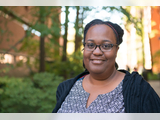Faculty Highlight: Dr. Patton
By Elisabeth Chen
Dr. Elizabeth Patton, who teaches MCS 399: Methods in Media and Communication Studies (the class the precedes MCS 499, the capstone seminar), is an Associate Professor for Media and Communication Studies as well as an affiliate faculty member for Gender, Women’s, + Sexuality Studies. Dr. Patton recently received an award from The National Endowment for the Humanities (NEH) for her research. Her book Easy Living: The Rise of the Home Office was published in 2020, and she is currently working on a new book project. She will be teaching MCS 399 again as well as MCS 101 in the Fall 2022 semester.
Dr. Patton graciously agreed to this interview even though she is currently on sabbatical.
What was your research about? Why is it important to you? Why is your research important for others?
“Most research on tourism and leisure does not examine personal media practices in relation to race, representation, resistance, and the role of place. My current research seeks to understand how everyday leisure practices are intertwined with public narratives and in conflict with them through the lens of media history. My goal is to examine how Black people resisted white supremacy during Jim Crow by documenting leisure practices and creating safe spaces for leisure and tourism. The right to leisure is important because everyone should be able to make time for rest, relaxation, and entertainment as part of our collective survival. Historically, the right to leisure has been connected to limiting the workday to eight hours and is defined in Article 24 of the Universal Declaration of Human Rights. This article argues everyone has a fundamental right to rest and leisure, which includes a limit on work hours and paid holidays. In terms of Black identities, I want to consider what the right to leisure means and its implications for those whose historical worth was defined by labor.”
As mentioned previously, Dr. Patton has taught MCS 399, which is a class that focuses a lot on how to effectively conduct research and what methods of research to use. As someone who has taken the class, I wanted to know how this class informed the way she conducted her own research:
How do you think the concepts specifically in MCS 399: Methods in Media and Communication Studies have factored into your research process?
“I used several of the research methods taught in MCS 399. For example, I plan to conduct oral history interviews with people that are willing to share their memories traveling during Jim Crow. I also use other historical methods, such as archival research, and textual methods such as ideological analysis and semiotics to analyze the meaning and significance of historical records such as advertisements and home movies. Many of the theory-informed methods discussed in class, e.g., intersectionality, and theories used in cultural studies, such as political economy also guide my theoretical perspective in interpreting historical records.”
What is your new book project about and what inspired you to begin this project?
“My new book project, Documenting Black Leisure as a Form of Resistance, is based on the research I previously described. I was inspired by two recent experiences. First, I recently looked through my grandparents’ photo album, which I hadn’t done since I was a child. My family’s collection of photographs and home videos will provide a starting point for my book. These records provide an insight into my family's leisure and travel experiences and their response to and resistance to segregation during the Jim Crow era. Second, I have always loved to travel and increasingly have engaged with online travel blogs, Facebook groups, such as Nomadness, and Black content creators’ vlogs on YouTube to identify safe places to visit. The Black Travel Movement community is a network of resources for travelers of color. It is a digitized Green Book on steroids!”
What do you hope readers will gain from this book? What have you gained through the writing process so far? What have been some challenges?
“The pandemic has certainly been a problem for research regarding travel and leisure, especially accessing archival documents. Fortunately, travel is starting to happen again, and I have been able to visit a few archives, such as the Kodak archives at the University of Rochester. Ultimately, I hope readers will understand the political importance of leisure in a system of capitalism and how African-Americans during Jim Crow practiced leisure as a form of resistance.”
Posted: June 16, 2022, 11:09 AM
